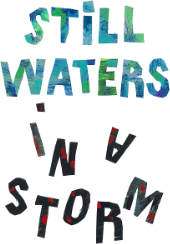William Egginton
As I stepped out of my cab on a sodden, cold January afternoon in Bushwick, an immigrant neighborhood that has largely been passed by in Brooklyn’s rush to rival Manhattan in property values, I looked around for the school I had come to visit. It took me a few moments to realize that I was standing right in front of it. In fact it was more of a store front than a school. Through the scratched glass window and door I could now see some long tables dispersed around a room filled with books. Books stacked haphazardly on shelves but also scattered on tabletops or in apparently random piles. I pushed the door open and was immediately greeted by a beaming Stephen Haff, the director, teacher, and all around force of nature behind Still Waters in a Storm.
A few months earlier Stephen had sent me an email that I called a Godfather invitation, in other words, one I couldn’t refuse. In it he described his one-room schoolhouse, with students from the ages of seven to 15, most of them the children of Spanish-speaking immigrants, in some cases undocumented, who come every afternoon after school for two hours to read, translate, and discuss literary classics. This year, he explained, his students had already begun to read and translate Don Quixote from the Spanish original and retell the story as their own, “reimagining the story of an old man in Spain in the late 1500s as a story of Spanish-speaking immigrant children living in poverty in Brooklyn today.” My mission, should I choose to accept it: “Please come guide my students for two hours on one afternoon as they take on this strange and beautiful project!” Did I mention that he teaches them Latin too?
A half an hour later, after meeting the kids and munching on the delicious potato tortillas with tomatoes and sour cream that one of the mothers had provided, we dove into two hours of translation and discussion that could have been taking place in one of my seminars at Hopkins. As we worked out how to render into English the famous scene in which Don Quixote blames his and Sancho’s inability to agree on whether the windmills are in fact giants or just windmills, Jonathan, a shy twelve-year old whose parents are from Ecuador, looked up and met my eyes. “They can’t agree on what the facts are,” he said. “That happens nowadays too.”
Still Waters is a radical experiment in learning that bucks the trend in education wherein every learning experience is evaluated in terms of its immediate and practical application. Stephen Haff presents his students with literary classics and asks them to translate them, both into a different language and a different world. He challenges them, in other words, to find common ground across time and culture with a distant world, and to bring that world into their own. In the words of another passionate ambassador of classical learning in the present time, Jeffrey Doerries, whose Theater of War project brings uses classical tragedy to help veterans heal from the ravages of PTSD, what reading the classics together shows us is that “we are not alone across time.” This was a truly enlightening experience.
As a result of my experience, I will continue on as adviser to the children in the writing of metafictional dialogues in which they converse with Cervantes, so that he listens to them just as they listen to him.
